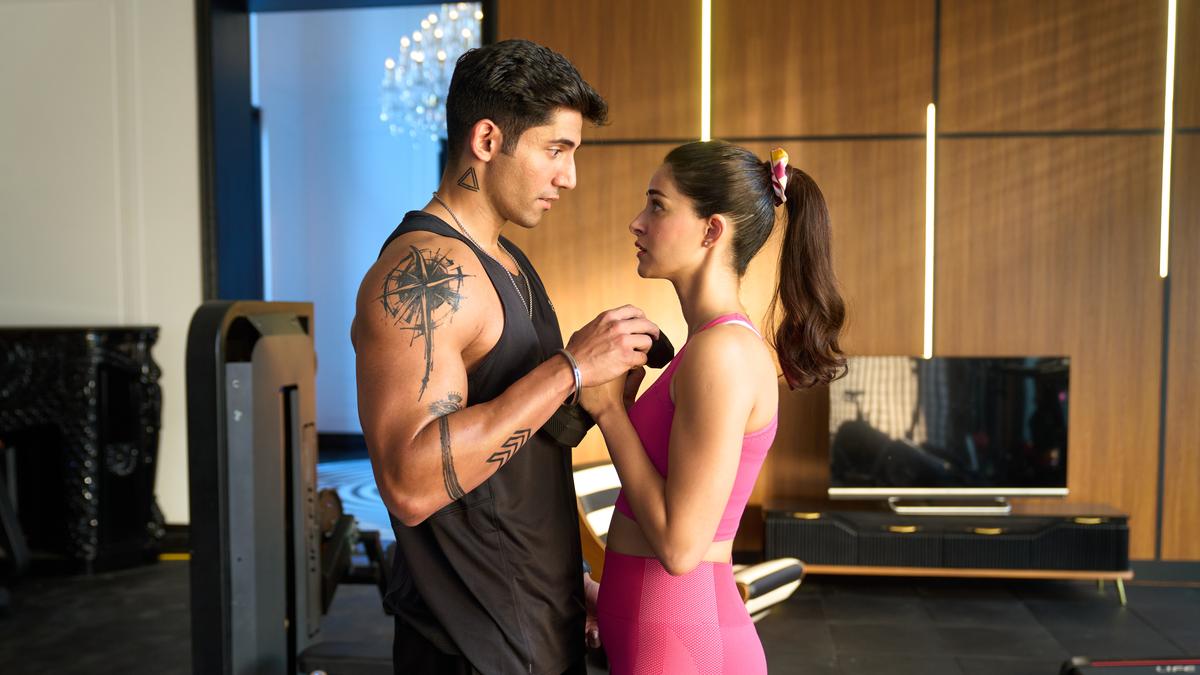
‘Call Me Bae’ series review: Ananya Panday carries a no-carbs comedy
The Hindu
Call Me Bae series review: Aiming for the snacky frivolity of Western sitcoms, this riches-to-rags comedy, led by Panday and Vir Das and created by Ishita Moitra, needed better writing
What hustle? What Mumbai? One of the most confusing things in Call Me Bae — a new comedy series starring Ananya Panday and streaming on Prime Video — is a generic rap number that plays in the initial episodes, reminding you how, once you’re there, the city of dreams will grind you down. This is a riches-to-rags comedy that hopes to amuse by airdropping its impossibly ditzy protagonist into the cut and thrust of ordinary Mumbai. Except, it wouldn’t know ordinary Mumbai if it sat next to it on the Virar local, sweating profusely or watching Taarak Mehta episodes.
The protagonist is Bella Chowdhury (Panday), or just Bae. A rich South Delhi socialite, she’s evicted by her husband, business tycoon Agastya (Vihaan Samat), after he catches her dallying with the trainer. A series of vaguely defined circumstances parks Bae, with her menagerie of expensive handbags, in Mumbai. Shunned by family and friends, Bae resolves to reclaim her sense of self-worth. This proves somewhat challenging— since Bae’s qualifications include, among other things, ‘psychic vegan cheese and wine pairing’ and ‘David Beckham studies’. She also calls an autorickshaw ‘tuktuk’ (Kim Kardashian, jetting in for the Ambani wedding two months ago, did a whole lot better).
Luckily, Bae has one saving grace. She once did a course in Social Media Journalism, or, as she herself puts it, ‘how to do in-depth stories in less than 140 characters’. This wins her an internship at a leading news channel where the staff roam around in leopard and spaceman costumes. Nevertheless, Bae begins to earn, under her own steam, and has soon built herself a small posse of supporters.
The series, created by Ishita Moitra and directed by Collin D’Cunha, has a disarmingly literal sense of humour. Bae is born with a literal golden spoon. She is scrupulously trained by her status-obsessed, fascinator-sporting mother (Mini Mathur) to become a trophy wife; an actual trophy flashes during the said disclosure. Some lines catch you by surprise (“Dinesh... let’s go to space”; “Hi Faye! I’m Bae”). Yet the wordplay isn’t matched by innovative dramatic situations. There are excruciating flashbacks to Bae’s less-than-perfect past—to her struggles with alcoholism and shoplifting, to fragments of her fraying marriage, to the time she volunteered at an animal shelter in New York.
Call Me Bae has too many Western sitcoms on its mind to fully become its own show. While Bae name-checks The Marvelous Mrs. Maisel, there are shades of Schitt’s Creek, Two Broke Girls and Emily in Paris. Bae’s globe-trotting anecdotes aren’t nearly as fascinating as those of Alexis Rose in Schitt’s Creek. Mumbai, meanwhile, hardly registers as a backdrop. The ‘Losttel’ Bae checks into early on is a hippie-chic commune that can exist anywhere; her next house, shared with a colleague, is as spacious and moodily lit as you will expect from a Dharmatic production.
More than the #MeToo track that springs up midway through, with Bae and her gang chasing up an anonymous tip, the series is more engaging in its quieter, throwaway moments. At least one relationship, on the sidelines, blooms unexpectedly. The series may also have something interesting to say about mothers and children—and filial relationships in general. When a character complains that, being the child of a single mom, she was never ‘pampered’, another responds by saying that he was always pampered, though his mom, too, was single. “She would make me tea with lemon, ginger, cinnamon,” he recalls with love. There are different shades of parenting, and different shades of growth.
After Gehraiyaan (2022) and Kho Gaye Hum Kahan(2023), Panday once again plays a character who is, to put it politely, in her proximate wheelhouse. Her daffy, upbeat exuberance carries large swathes of dead narrative. Yet, it isn’t the most difficult role—beyond the fact that Bae is naturally nice, and enjoys getting plastered in moments of emotional stress, there isn’t much meat on her gluten-free plate. Vir Das, an instinctive and celebrated comic, wings it in the part of a muckraking anchor. Funniest of all is his managing editor. “We don’t want to be a news channel that’s on the wrong side of history,” he warns solemnly. Good for you, sir.

‘Madha Gaja Raja’ movie review: A familiar Vishal going hand-in-glove with a prime Santhanam, abs-flashing fights with a stock villain, and scantily clad women treated as mere sex symbols — Sundar C’s 12-year-old masala entertainer works as a reminder of what Tamil cinema has been missing out on, and what it has largely tried to correct itself from

















